Ain't No Bum
A father’s degrading opinion of a son can be the catalyst for a lifetime of low self-esteem and desultory behavior, a painful situation brought center stage in Ain’t No Bum. Every relationship exhibits idiosyncratic differences, but the somewhat stereotypical manifestation of hatred in a harassing, alcoholic parent pursuing an adult child for money may cross the line drawn between a flawed character and one that is just plain trite.
In this early-twentieth-century scenario, Milt McCoy attempts to deter the belligerent advances of Frank, his disturbed dad, as the aging man launches into bitter rages and violent outbursts over the course of many years. Raised by his grandparents, Milt does not acknowledge or respect his biological father.
The story opens shortly after World War I and concludes after World War II. Fueled by booze, Frank’s venomous assertions that Milt is a worthless bum are spurred primarily by his desire to obtain his son’s Civilian Conservation Corps family payments, which were diverted to Milt’s grandparents.
Although this poignant historical novel is fairly well edited and McCreight has a concise writing style, the dialogue in the story often lapses into hackneyed awkwardness. Internal monologues, on the other hand, delivered in the first person and italicized in the text, allow the reader to experience the emotions of several characters in brief, intermittent confessions. This approach verges on experimental, but the book’s overall quality would be higher if the actions of the protagonists, especially Frank, were less easily anticipated.
In one scene, a staggering lunge takes an expected turn: “Milt took one quick step to the left to avoid Frank’s wild right roundhouse punch. His sloppy drunken swing not only missed Milt, but also launched him into a stumbling lurch that carried him past Milt.”
This type of situation arises repeatedly, involving Milt’s family, friends, and acquaintances, and of course, the sheriff. At times, the stalking seems a bit overdone for dramatic impact. This may play for entertainment purposes, but the excessive nature of Frank’s sabotage of his son lacks a certain realistic subtlety.
Saturated with Depression-era poverty and conservative attitudes, as well as straitlaced morals regarding sex and liquor consumption that persisted long after the repeal of Prohibition in 1933, the book is a conglomeration of dated hypocrisy and severe addiction. Love scenes are faded out on cue: “They kissed gently and embraced, with care to avoid once again arousing each other’s passion.”
Milt is portrayed as the traditional hero, Frank the tainted villain. The love of an intelligent woman saves Milt from what could have been his own tragedy—loneliness. This glimpse of a downtrodden man’s life will appeal to lovers of blue-collar nostalgia.
Reviewed by
Julia Ann Charpentier
Disclosure: This article is not an endorsement, but a review. The publisher of this book provided free copies of the book and paid a small fee to have their book reviewed by a professional reviewer. Foreword Reviews and Clarion Reviews make no guarantee that the publisher will receive a positive review. Foreword Magazine, Inc. is disclosing this in accordance with the Federal Trade Commission’s 16 CFR, Part 255.

